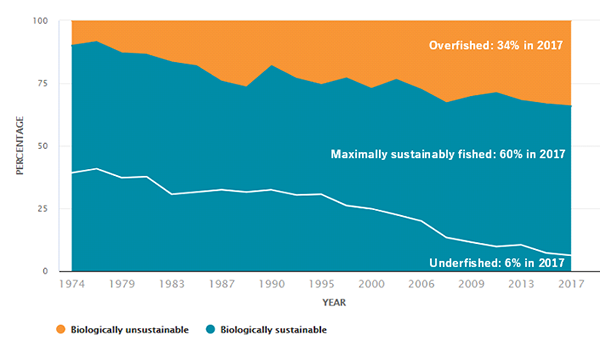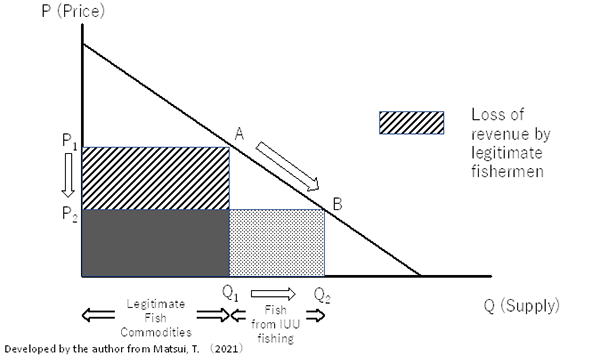Seminar report on IUU fishing
Sustainable Fisheries – Stakeholders’ Perspectives
Fishery resources are the very basis of our seafood culinary culture, however, they are on a declining trend. To conserve and sustainably manage them, it is considered vital that illegal, unreported and unregulated (IUU) fishing practices be eliminated, along with overfishing. It is equally important that the so called “harmful fishery subsidies” that contribute to IUU fishing be stamped out. On July 15th, 2021, the Environmental Partnership Council (EPC), a Tokyo based non-profit organization, organized an online multi-stakeholder meeting to discuss measures to eliminate IUU fishing in order to achieve sustainable fisheries(1). The meeting was organized with the support of the Global Environment Information Centre (GEOC), the Journalists Association of Japan, and the Global Environment Forum of Japan, as well as Internews, a US based non-profit organization. The speakers featured at the meeting were from various organizations and the discussions they had were vibrant. The meeting was open to the public and the speakers also interacted with the audience. This article highlights the rationale of the meeting and key points underlining the discussions. The following are some of the topics that were covered.
(1) EPC. 2021. Online Seminar SDG14 Stakeholders’ Meeting – Ending IUU Fishing and Harmful Subsidies – Pursuing Collaboration and Partnership. 15 June 2021. https://sus-cso.com/kiji/sdg14_210715_e.
SDG 14 and Sustainable Fisheries
Sustainable Development Goal (SDG) 14, “Life Below Water” includes section 14.2, “To sustainably manage and protect marine and coastal ecosystems,” section 14.4, “End IUU fishing and destructive fishing,” and 14.6, “Prohibit subsidies that lead to overfishing and IUU fishing.” It was hoped that these goals would be achieved by the end of 2020, however, in Global Biodiversity Outlook (BO-5) that was released in September 2020, it was reported that Aichi Target 6, that aimed at sustainable management of fish and other species, has not been achieved. The Food and Agriculture Organization of the United Nations (FAO) warned that 34% of the world’s fish species are subject to overfishing and that fishery resources are being depleted (Figure 1). Ian Urbina, journalist and author of the book “Outlaw Ocean” (Knopf Doubleday Publishing Group, 2019) believes that IUU fishing is not only an overfishing problem, but also a hotbed of human rights abuses such as forced labor. (Urbina’s lecture, “Perspectives from the frontline of IUU fishing” 178th Ocean Forum (Feb. 26, 2021)(2).
(2) OPRI-SPF. 2021. Perspectives from the frontline of IUU fishing” 178th Ocean Forum. 26 February 2021. https://www.youtube.com/watch?v=5st-FD8cbIw&feature=youtu.be.

Figure 1: Current status of global fishery resources (1974-2017)
Countermeasures against IUU fishing
There are many types of IUU fishing, for example, fishing by unauthorized fishing vessels, fishing that exceeds catch quotas, fishing without reporting the catch volume, fishing that does not comply with local fishing rules or ordinances. In 2009, the Port State Measures Agreement (PSMA) was adopted to prevent the landing of IUU fishery commodities, and to promote international cooperation. Japan acceded to the PSMA in 2017 and since has been working hard to implement it. In 2018 Japan strengthened its Fisheries Law, increasing the penalty for illegal fishing to three years imprisonment, along with a fine of up to 30 million yen. In December 2020, The Improvement of Domestic Trade of Specific Marine Animals and Plants Act was enacted, which will make it compulsory to attach catch certification to imports and exports. The target species of the act are yet to be finalized. The Fisheries Agency is currently putting together a policy on how to best designate target fish species and is considering species that are highly affected by IUU fishing, such as abalone and sea cucumbers. They are also planning to increase the number of target fish species in stages thereafter. Some participants at the meeting pointed out that the European Union requires seafood traders to furnish catch certification for all fish species and the United States requires traders to furnish catch certification for 13 fish species, so in the light of these already implemented policies it was suggested that Japan should follow suit as soon as possible and require catch certification for trading in order to promote proper resource management. They also suggested that eel, squid, saury and tuna should be designated as target species.
Economic impacts of IUU fishing
The influx of IUU marine products upsets the market by lowering fish prices. Fishermen who practice sustainable fishing and are certified by the Marine Stewardship Council (MSC), a global scheme to demonstrate sustainability in fishing and fishery resource management, bear the economic cost of managing their fishery resources, obtaining certification and more. If IUU marine products are marketed at low prices, the overall supply of fishery commodities will increase, pushing down the price of sustainably caught marine products. As a result, the profits of fishermen who are engaged in sustainable fishing will be reduced (Figure 2). It was also pointed out that should IUU fishery commodities be rejected by Europe, the United States or other countries following sustainable fishing policies, there would be a chance that the Japanese market would become an alternative export destination market. This could result in unfair competition in the market and would probably deprive European companies of the opportunity to export their seafood commodities to Japan.
The Effect of Harmful Fisheries Subsidies
On July 15, the World Trade Organization (WTO) held a ministerial meeting and confirmed that it plans to finalize an international agreement this year to eliminate fishing subsidies that lead to overfishing and IUU fishing.

Figure 2 Economic losses from IUU fishing
Ambassador Santiago Wills, the Colombian Ambassador to the WTO, who is chairing IUU fishery subsidy negotiations, stressed the importance of reaching an international agreement, not only on the conservation of fisheries resources, but also on the reduction of greenhouse gas emissions through appropriate constructive fiscal spending and reduced fuel use. Amb. Wills spoke at the Multi-stakeholder Policy Dialogue Symposium: “Progress and Challenges Toward Eliminating IUU Fishing and Harmful Fishing Subsidies” organized by the Ocean Policy Research Institute of the Sasakawa Peace Foundation on 6 July 2021 (3).
(3) OPRI-SPF. 2021. Progress and Challenges Toward Eliminating IUU Fishing and Harmful Fishing Subsidies. 6 July 2021. https://www.youtube.com/watch?v=HtW8gpomxG8.
Distribution, sales and consumer response
Usufuku Honten in Kesennuma City, and Meiho Fishery in Shiogama City, both in Miyagi Prefecture, acquired MSC certification and are now practicing sustainable fishing and selling sustainable marine products. It was, however, pointed out that MSC certificates do not immediately guarantee high wholesale and retail prices and that unrelenting efforts are required to expand sales channels. Kijima, a restaurant enterprise that operates restaurants in the Tokyo metropolitan area, obtained CoC certification for its processors and sellers, and uses MSC and ASC certified seafood in its products. The Haneda Ichiba Co., Ltd. connects local fish markets and progressive fishermen with markets in Tokyo by air and bullet trains and adds value to their seafood by maintaining their freshness and flavor, is striving to expand sales channels in the Tokyo metropolitan area. Sailors for the Sea, a non-profit organization, has produced a reference booklet called the Blue Seafood Guide, which lists sustainable seafood products and is working with restaurants and other organizations to procure and provide sustainable seafood. The Zushi Marina’s SDGs event organized this summer was a success. It raised public awareness on seafood sustainability by featuring on the menu MSC certified tuna and salmon, and Aquaculture Stewardship Council (ASC) certified aquaculture seafood, as well as organic vegetables.
Future challenges to achieving sustainable fisheries and seafood markets
During the discussions, the speakers were enthusiastic on the initiatives and challenges ahead that would be needed to achieve sustainable fisheries and seafood markets. As an important player in the seafood culinary culture and the world’s second largest importer of fishery commodities and seafood, Japan must set an example and coordinate and expand social collaboration in order to fulfill its responsibility to conserve the world’s diverse marine resources and pass them on to future generations.
Ocean Policy Research Institute of the Sasakawa Peace Foundation


